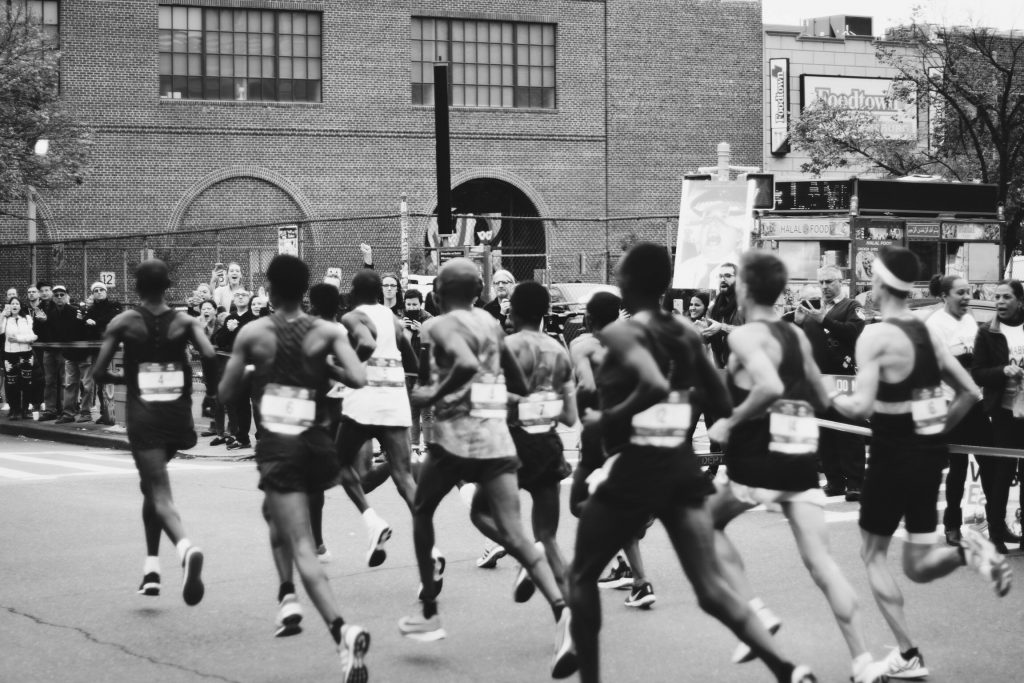
Race morning arrives with its familiar cocktail of sensations. Your stomach churns despite eating the same breakfast you’ve consumed dozens of times before. Heart pounds harder than during your easy training runs. Hands tremble slightly as you pin your race bib. Another unnecessary trip to the bathroom. None of this is random—your nervous system is simply doing what millions of years of evolution programmed it to do.
The Science Behind Pre-Race Anxiety
When your brain realizes that today matters, it flips the switch on your sympathetic nervous system. Your bloodstream gets hit with a wave of adrenaline and noradrenaline. Heart rate jumps, breathing quickens, and blood vessels tighten up to push more oxygen where your muscles need it most. Cortisol steps in too, breaking down stored glucose and fat so you’ve got fuel ready to go from the moment you start moving.
At the same time, blood gets pulled away from your gut and redirected to your legs and brain. What does this feel like? Jittery energy, cotton mouth, that restless feeling like you need to keep moving. It’s your body getting everything lined up for what’s about to happen.
This stress response happens to everyone. Your nervous system can’t tell the difference between a neighborhood 5K and the Boston Marathon—it just knows something important is coming. Same ancient wiring our ancestors used when they had to run from danger, just applied to a very different situation.
Why Pre-Race Nerves Actually Help Running Performance
That hormonal surge isn’t a malfunction—it’s a performance feature. Moderate adrenaline levels sharpen mental focus, open airways more fully, and increase the speed of muscle contractions. Too little activation leaves you feeling sluggish at the starting line. When you get too amped up, you’re basically burning through energy stores before the race even begins.
Finding that sweet spot is everything: you want enough activation to feel sharp and ready, but not so much that you’re wasting fuel. Most personal records in distance running happen in this sweet spot, where you feel thoroughly alive but remain in control.
How to Manage Race Day Anxiety: Evidence-Based Strategies
You can’t eliminate pre-race nerves, nor should you try. But you can channel them productively with these proven techniques.
First, reframe the sensation. Don’t attempt to „calm down“—recognize it as activation. Your system is preparing to deliver the performance you’ve trained for.
Breathing techniques for runners help regulate the stress response. Try four seconds in, six seconds out. Extended exhales stimulate the vagus nerve, which helps moderate the sympathetic surge without shutting it down completely.
Pre-race routine becomes your anchor. Pack your running gear the night before. Map your route to the start. Use the same warm-up sequence every time. Eliminating decision-making conserves mental energy and reduces additional stressors.
Physical movement burns off excess adrenaline. A few easy strides or a short shakeout jog helps settle your heart rate into race rhythm while maintaining the underlying activation you need for optimal performance.
Stay focused on your own race preparation. Other runners‘ splits, equipment, or warm-up routines are irrelevant distractions that only add unnecessary stress to an already heightened state.
Converting Running Anxiety into Peak Performance
Those butterflies represent oxygen, glucose, and enhanced neural firing waiting to be deployed. Each shaky breath signals your body loading the metabolic gun so you can fire when race timing starts. Instead of resisting the sensation, lean into it. Let that initial surge carry you through the inevitable chaos of the opening kilometers.
You’ve put in the training miles. Now trust the process.
Race Day Mental Preparation Tips
Remember the golden rule of race day preparation: nothing new on race day. Eat foods you’ve tested during training runs. Wear running shoes you trust completely. You don’t need to feel calm to perform well in distance running—you need to feel ready.
The hammering heart and twisted stomach aren’t warning signs. They’re evidence that this race matters to you, that the training you’ve invested has meaning. Take a deep breath, stand tall, and let your system execute what it was designed to do.
Final Race Strategy
Your job now is straightforward: show up to the starting line, trust your training preparation, and spend everything you’ve been saving for this moment. Those pre-race nerves? They’re your secret weapon for running success.

Schreibe einen Kommentar